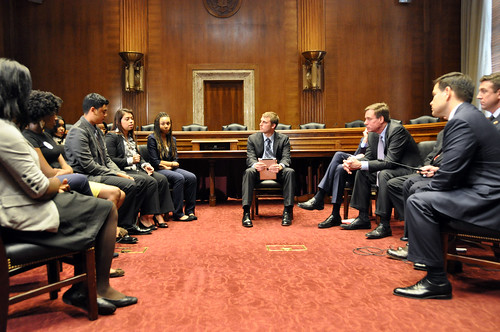Press Releases
Sens. Warner, Rubio, Wyden Introduce Student Right to Know Before You Go Act
Bipartisan legislation will make relevant higher education data available to students, families
May 09 2013
WASHINGTON – U.S. Sens. Mark R. Warner (D-VA), Ron Wyden (D-OR) and Marco Rubio (R-FL) today introduced The Student Right to Know Before You Go Act to ensure that a wide range of comparative data about higher education programs is more readily available for prospective students and their families. They discussed their bipartisan legislation during a roundtable on Capitol Hill this morning with students, parents and school counselors.
The legislation would streamline existing institutional reporting requirements to give students and their families more tools to easily compare graduation rates, student loan debt, employment prospects and potential future earnings as they make important decisions about higher education. The information, which generally is already reported by colleges and universities to a variety of federal, state and other agencies, also will give policymakers the ability to better assess the effectiveness of various government-backed educational programs. Similar bipartisan legislation has been introduced in the House by U.S. Reps. Duncan Hunter (R-CA) and Robert Andrews (D-NJ).
"Many high school seniors who are heading to college this fall have just paid their tuition deposits, and they likely have real questions about what value they are getting for their money," Sen. Warner said. "This bipartisan legislation will combine relevant information in a rational way so that students and their families can access comparative information on which colleges and which majors will result in a good job. Our legislation will connect the information already collected by states and schools, and eventually post it online where it will be accessible directly to students as they make one of the most important investments they’ll make during their lifetimes.”
“A college education is one of the most important investments an American can make in their lifetime, so it’s critical that we equip potential students and their families with as much information as possible,” Sen. Rubio said. “With this legislation we can finally provide meaningful, easily accessible data to make higher education decisions easier for the 21st century student.”
“There’s been a needed focus on access to higher education, but it’s time to bring value into the equation,” Sen. Wyden said. “Instead of forcing students to make blind decisions on such a huge investment, this bill would empower them with a wide range of information about what their choices will mean in working world.”
Ana Blanco, a junior at Alexandria’s TC Williams high school, explained at today’s roundtable how the bill could help students like her. “I’m going to be the first from my family to graduate college,” she told the lawmakers, “and right now it’s hard when your parents don’t really know the college process , and you’re the one who has to do the research… to find out ‘what am I going to do with my life, where am I going to go.’ To me it [the proposal] sounds like it would be a great benefit.”
Jayne Fonash, Guidance Director at the Loudoun Academy of Science high school, agreed that the legislation addressed an important issue for students, families, and those who help them through the college process. “I appreciate your efforts to put in one place information that’s crucial for my students and their families,” she said. “I have probably spent more hours this year in conversations with families about how best to spend their child’s education dollars than I have in the last five or ten years combined. Putting in their hands and their parents’ hands information about affordability, loans and debt will be another piece that will help us better serve our students.”
Although today many schools do collect this information, they do not consolidate it with that collected by other schools, states, or organizations so that effective comparisons could be made. State and private analyses typically only examine first–time, full-time students, leaving out many who attend community and vocational colleges.
The legislation would direct the Secretary of Education to make the information available online in an easily accessible format. Individual privacy would be strictly maintained with safeguards to ensure that no personally identifiable information could ever be disclosed, and the system would be audited for data quality, validity and reliability. Using information that is already gathered, the bill would allow student records to be matched with employment and earnings data. The results would be highly accurate and informative. The Student Right to Know Before You Go Act would provide students and their families with the opportunity and additional tools needed for a more complete picture of the value of their education.
Rising educational costs and uncertainty in the job market have made the stakes higher than ever for individuals looking to invest in higher education. According to the College Board, the average cost of tuition and fees for the 2012–2013 school year was $29,056 at private colleges, $8,655 for state residents at public colleges, and $21,706 for out-of-state residents attending public universities. Two-thirds of college seniors who graduated in 2011 had student loan debt, with an average of $26,600 per borrower.
The legislative text is available here, and a summary of the specific data improvements under the Student Right to Know Before You Go Act is available here.
